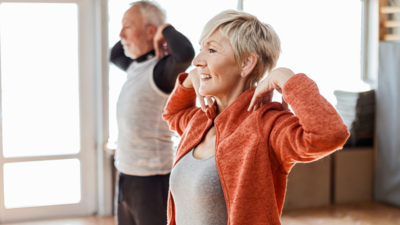ARTICLE AD BOX

Struggling to fall asleep or stay asleep is a common concern among older adults. While sleep medications may offer temporary relief, they often come with side effects or long-term risks.But there’s one simple, natural remedy that experts continue to recommend: regular physical activity. And the best part? You don’t need to run marathons—even gentle daily movement can do wonders for sleep quality in seniors.Why Sleep Becomes Tricky with AgeAs we age, our bodies produce less melatonin, the hormone that regulates sleep. In addition, conditions like arthritis, heart problems, or medications can further disturb rest.Common sleep issues in seniors include:
- Trouble falling asleep
- Waking up frequently during the night
- Early morning awakenings
- Daytime fatigue or drowsiness
Lack of quality sleep can lead to memory issues, poor balance, low immunity, and mood swings. That’s why finding a sustainable sleep solution is crucial—and exercise fits the bill.How Exercise Supports Better SleepHere’s how physical activity directly benefits sleep:a) Reduces Stress and AnxietyExercise lowers levels of cortisol (the stress hormone), helping the mind relax.
A calmer mind makes it easier to fall asleep.b) Regulates the Body ClockRegular movement helps reset your circadian rhythm—the internal clock that tells you when to wake and sleep. Outdoor walks, in particular, expose you to natural sunlight, which boosts melatonin production at night.c) Tires the Body NaturallyEven moderate activity can make you feel physically tired in a healthy way—making bedtime more inviting and sleep more satisfying.d) Improves Deep Sleep QualityStudies show that seniors who exercise consistently experience more slow-wave sleep (the deep, restorative phase), which is vital for memory and healing.Best Types of Exercises for Sleep in SeniorsYou don’t need high-intensity workouts to sleep better. These gentle but effective activities work well: Yoga and StretchingPromotes flexibility and relaxes muscles. Gentle evening yoga can prepare the body for rest. WalkingA brisk 20-30 minute walk—especially in the morning—can help regulate your sleep-wake cycle. Strength TrainingLifting light weights or using resistance bands improves muscle strength and has shown sleep benefits when done 2-3 times a week. Tai Chi or QigongThese slow, flowing movements calm the nervous system and have been found to reduce insomnia in older adults. When Is the Best Time to Exercise for Sleep?Morning or afternoon workouts are ideal for improving night-time sleep.Avoid vigorous activity within 2 hours of bedtime, as it might energize you instead of helping you wind down.However, gentle evening stretching or a slow walk after dinner can actually promote calm and relaxation.Tips to Make Exercise a Sleep-Friendly Habit
- Start small: Even 10 minutes a day can help. Gradually build up.
- Be consistent: Daily activity creates the best long-term results.
- Pair with fresh air: Walks in natural light strengthen your sleep-wake rhythm.
- Mix it up: Combine strength, flexibility, and aerobic movements for full-body benefits.
- Listen to your body: Choose activities that feel good and don't strain your joints.
For seniors, exercise isn’t just about physical health—it’s about restoring peace of mind, calm nights, and brighter mornings. Move more during the day. Sleep better at night. Age gracefully with each restful breath.Would you like a visual checklist for a “Sleep-Boosting Daily Movement Plan for Seniors”?



.png)
.png)
.png)
















 1 week ago
6
1 week ago
6









 English (US) ·
English (US) ·